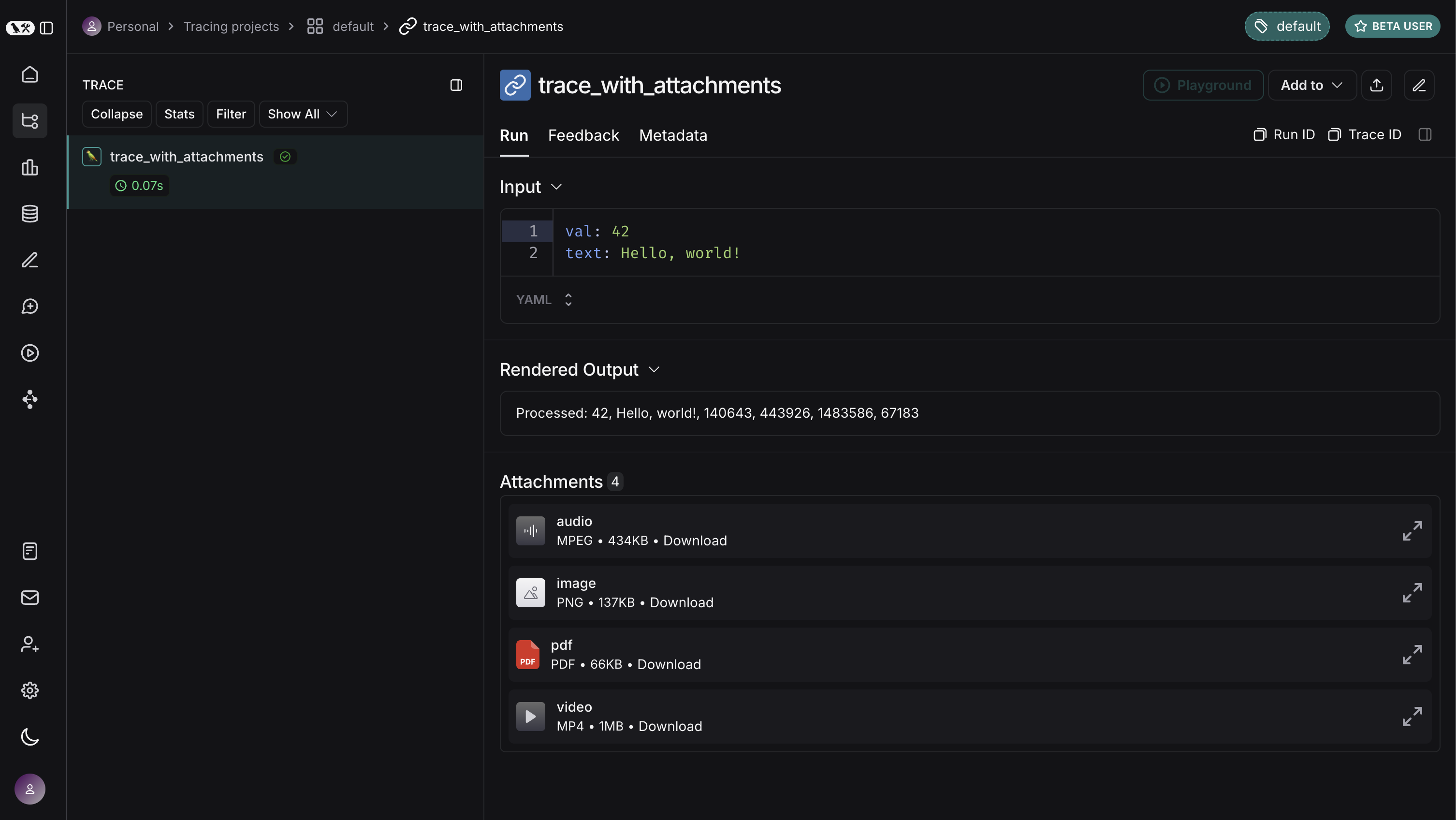Upload files with traces
Before diving into this content, it would be helpful to read the following guides:
The following features are available in the following SDK versions:
- Python SDK: >=0.1.141
- JS/TS SDK: >=0.2.5
LangSmith supports uploading binary files (such as images, audio, videos, PDFs, and CSVs) with your traces. This is particularly useful when working with LLM pipelines using multimodal inputs or outputs.
In both the Python and TypeScript SDKs, attachments can be added to your traces by specifying the MIME type and binary content of each file.
This guide explains how to define and trace attachments using the Attachment type in Python and Uint8Array / ArrayBuffer in TypeScript.
- Python
- TypeScript
In the Python SDK, you can use the Attachment type to add files to your traces.
Each Attachment requires:
mime_type(str): The MIME type of the file (e.g.,"image/png").data(bytes): The binary content of the file.
Simply decorate a function with @traceable and include your Attachment instances as arguments.
from langsmith import traceable
from langsmith.schemas import Attachment
@traceable
def trace_with_attachments(
val: int,
text: str,
image: Attachment,
audio: Attachment,
video: Attachment,
pdf: Attachment,
csv: Attachment,
):
return f"Processed: {val}, {text}, {len(image.data)}, {len(audio.data)}, {len(video.data)}, {len(pdf.data), {len(csv.data)}}"
# Helper function to load files as bytes
def load_file(file_path: str) -> bytes:
with open(file_path, "rb") as f:
return f.read()
# Load files and create attachments
image_data = load_file("my_image.png")
audio_data = load_file("my_mp3.mp3")
video_data = load_file("my_video.mp4")
pdf_data = load_file("my_document.pdf")
csv_data = load_file("my_csv.csv")
image_attachment = Attachment(mime_type="image/png", data=image_data)
audio_attachment = Attachment(mime_type="audio/mpeg", data=audio_data)
video_attachment = Attachment(mime_type="video/mp4", data=video_data)
pdf_attachment = Attachment(mime_type="application/pdf", data=pdf_data)
csv_attachment = Attachment(mime_type="text/csv", data=csv_data)
# Define other parameters
val = 42
text = "Hello, world!"
# Call the function with traced attachments
result = trace_with_attachments(
val=val,
text=text,
image=image_attachment,
audio=audio_attachment,
video=video_attachment,
pdf=pdf_attachment,
csv=csv_attachment,
)
In the TypeScript SDK, you can add attachments to traces by using Uint8Array or ArrayBuffer as data types.
Each attachment's MIME type is specified within extractAttachments:
Uint8Array: Useful for handling binary data directly.ArrayBuffer: Represents fixed-length binary data, which can be converted toUint8Arrayas needed.
Wrap your function with traceable and include your attachments within the extractAttachments option.
In the TypeScript SDK, the extractAttachments function is an optional parameter in the traceable configuration. When the traceable-wrapped function is invoked, it extracts binary data (e.g., images, audio files) from your inputs and logs them alongside other trace data, specifying their MIME types.
type AttachmentData = Uint8Array | ArrayBuffer;
type Attachments = Record<string, [string, AttachmentData]>;
extractAttachments?: (
...args: Parameters<Func>
) => [Attachments | undefined, KVMap];
import { traceable } from "langsmith/traceable";
const traceableWithAttachments = traceable(
(
val: number,
text: string,
attachment: Uint8Array,
attachment2: ArrayBuffer,
attachment3: Uint8Array,
attachment4: ArrayBuffer,
attachment5: Uint8Array,
) =>
`Processed: ${val}, ${text}, ${attachment.length}, ${attachment2.byteLength}, ${attachment3.length}, ${attachment4.byteLength}, ${attachment5.byteLength}`,
{
name: "traceWithAttachments",
extractAttachments: (
val: number,
text: string,
attachment: Uint8Array,
attachment2: ArrayBuffer,
attachment3: Uint8Array,
attachment4: ArrayBuffer,
attachment5: Uint8Array,
) => [
{
"image inputs": ["image/png", attachment],
"mp3 inputs": ["audio/mpeg", new Uint8Array(attachment2)],
"video inputs": ["video/mp4", attachment3],
"pdf inputs": ["application/pdf", new Uint8Array(attachment4)],
"csv inputs": ["text/csv", new Uint8Array(attachment5)]
},
{ val, text },
],
}
);
const fs = Deno // or Node.js fs module
const image = await fs.readFile("my_image.png"); // Uint8Array
const mp3Buffer = await fs.readFile("my_mp3.mp3");
const mp3ArrayBuffer = mp3Buffer.buffer; // Convert to ArrayBuffer
const video = await fs.readFile("my_video.mp4"); // Uint8Array
const pdfBuffer = await fs.readFile("my_document.pdf");
const pdfArrayBuffer = pdfBuffer.buffer; // Convert to ArrayBuffer
const csv = await fs.readFile("test-vals.csv"); // Uint8Array
// Define example parameters
const val = 42;
const text = "Hello, world!";
// Call traceableWithAttachments with the files
const result = await traceableWithAttachments(val, text, image, mp3ArrayBuffer, video, pdfArrayBuffer, csv);
Here is how the above would look in the LangSmith UI. You can expand each attachment to view its contents.
